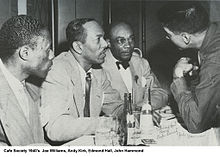Andy Kirk
Andrew Dewey Kirk (born May 28, 1898 in Newport , Kentucky , † December 11, 1992 in New York City , New York ) was an American big band leader and bassist (especially bass saxophonist and tuba player).
Life
Kirk grew up in Denver , where he received lessons from Paul Whiteman's father, Wilberforce Whiteman . He began in 1918 as a bass saxophonist and tuba player with the George Morrison Orchestra; his wife Mary Colston Kirk played the piano there. In 1925 he moved to Dallas , where he played Dark Clouds of Joy with Terrence Holders . In 1929 he took over the band (he was voted leader by the others) and renamed it Twelve Clouds of Joy . She had her great success after moving to Kansas City in 1929, where the early form of swing developed in the 1920s and where her first recordings were made for Brunswick in 1929–1930 . After a crisis in which the band was almost taken over by Blanche Calloway , they were the second big band from Kansas City to achieve national renown alongside Bennie Moten's band. Their headquarters were the Pla Mor Ballroom on 32nd and Main streets, then Fairyland Park and Winwood Beach. Occasionally, however, they also toured the west and east coasts. In 1936 they had a big hit with "Until the Real Thing Comes Along". It was sung by Pha Terrell , who contributed a lot to the band's success with his high tenor voice - similar to the later falsetto voices in the Ink Spots and the Platters in the 1950s.
They owe their success not least to the arrangements and compositions of pianist Mary Lou Williams , who was with the band from 1929 to 1942. The original pianist Marion Jackson had not appeared before the first recording session for Brunswick Records in 1929 and was replaced by Mary Lou Williams, who was then the wife of band member and saxophonist John Williams and whose playing pleased unit manager Dave Kapp. Williams only became an official member of the Twelve Clouds of Joy in 1931 ; she also appeared on Kirk's number 1 hits I Won't Tell You (I Love You) (1938) and Now I Lay Me Down to Dream (1940, # 19). Other members of the band were for a time Allen Durham , Buddy Tate (tenor saxophone), Don Byas , Ben Webster , Fats Navarro , Howard McGhee , Harold Shorty Baker , Kenny Kersey , Claude Williams (violin), Dick Wilson (saxophone) and Charlie Parker for short .
After the departure of Mary Lou Williams in 1942, Kirk downsized the not very large big band to 17 members, including musicians of (later) modern jazz such as Navarro, McGhee and Byas. The loss of her main arranger was clearly noticeable. In October 1942, the band had a hit on the new "Harlem Hit Parade" (the forerunner of the R&B charts) with "Take It and Git". In 1948 the band broke up. Kirk briefly had a band in the early 1950s (and occasionally led spontaneous bands in the 1970s). It then became professionally active (hotel manager, real estate agent, for the musicians' union, most recently active for the Jehovah's Witnesses ).
In 1991 he received the NEA Jazz Masters Fellowship .
|
Chart positions Explanation of the data |
||||||||||||||||||||||||||||||||||||||||||||||||||||||||||||||||||||||||||||||||||||
| Singles | ||||||||||||||||||||||||||||||||||||||||||||||||||||||||||||||||||||||||||||||||||||
|
||||||||||||||||||||||||||||||||||||||||||||||||||||||||||||||||||||||||||||||||||||
literature
- George Simon: The Big Bands . MacMillan 1967, 1971, Schirmer Books 1981.
- Andy Kirk: My Story . In: Jazz Review , Volume 11, February 1959.
- Andy Kirk: Twenty Years on Wheels. As told to Amy Lee . University of Michigan Press, Ann Arbor 1989.
- Ross Russell: Jazz Style in Kansas City and the Southwest . University of California Press, Berkeley 1971.
- Frank Driggs & Chuck Haddix Kansas City Jazz: From Ragtime to Bebop - A History . Oxford University, Oxford 2005, ISBN 978-0-19-530712-2 .
- George Burrows: The Recordings Of Andy Kirk And His Clouds Of Joy . Oxford University Press, 2020. ISBN 9780199335596
Web links
- The Clouds of Joy in the Red Hot Archive
- Biography (English)
- Biography in the Bigband Library
Individual evidence
- ↑ Driggs, Haddix: Kansas City Jazz . P. 105f.
- ↑ All plates 78er. Individual references for US Billboard Black: Gerhard Klußmeier: Jazz in the Charts. Another view on jazz history. Liner notes and booklet for the 100 CD edition. Membrane International, ISBN 978-3-86735-062-4 .
| personal data | |
|---|---|
| SURNAME | Kirk, Andy |
| ALTERNATIVE NAMES | Kirk, Andrew Dewey |
| BRIEF DESCRIPTION | American big band leader and bassist |
| DATE OF BIRTH | May 28, 1898 |
| PLACE OF BIRTH | Newport , Kentucky |
| DATE OF DEATH | December 11, 1992 |
| Place of death | New York City , New York |
